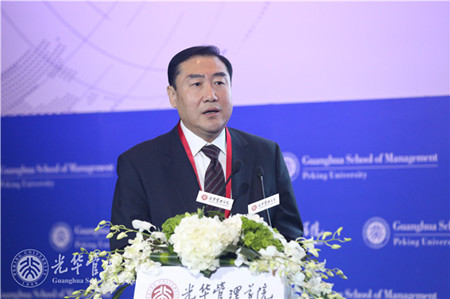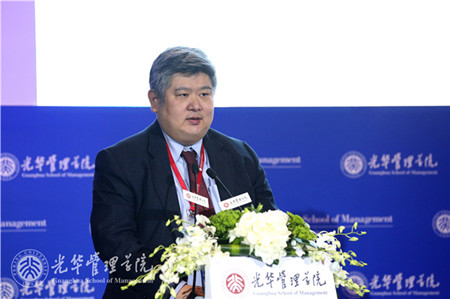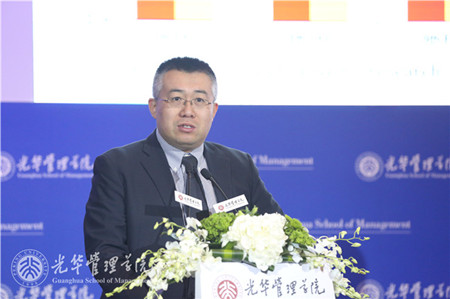Peking University, March 30, 2018: Leading policy insiders have mapped out their view of China’s economic outlook, calling for higher quality growth, reinforced financial risks prevention mechanisms, strengthening of the Belt and Road Initiative and a re-invention of the household wealth management system.

This event took place at the “Lianghui Review Forum: 2018 China Economic Outlook” held by the Peking University’s Guanghua School of Management, in Beijing, on March 21.
The forum gathered leading scholars, officials, diplomats, business leaders and the School’s alumni to analyze the lately concluded annual Two Sessions – the annual meeting of the National People’s Congress and Chinese People’s Political Consultative Conference.
Goals and projects were developed at the Two Sessions as the annual Government Work Report delivered by Premier Li Keqiang said “GDP growth of around 6.5 percent will enable China to achieve relatively full employment”.
The lecturers at the forum shared their fresh ideas in accordance with the lately set blueprints and spoke on how the changing landscape of the country will influence people and businesses, and on how to tackle potential issues.
MANAGING RISKS FOR QUALITY
Liu Qiao, dean of Guanghua School of Management of Peking University, noted that “high-quality development” has become a key phrase at the 19th National Congress of the Communist Party of China, the Central Economic Work Conference last year and the Two Sessions this year, and it is crucial for the future of China.
 Liu Qiao
Liu Qiao
The country has to shift its economic paradigm from seeking high growth to seeking high quality growth, and this will bring about changes in a range of fields, spanning economic and industrial development.
China has achieved a slew of economic miracles, Liu said, noting that in the past 40 years, the total volume of China's economy has grown more than 34 times, 700 million people got out of poverty, and China's per capita GDP has grown from $200 to $9000.
Infrastructure was greatly developed in the past 40 years: industrialization, high-speed rail, and the investment in the highway network are especially compelling examples.
When summing up China’s recipe for its previous success, Liu mentioned the country’s basic pattern focusing on infrastructure – a very effective strategy for China's industrialization – and the country's proactive involvement in the global value chain.
The country's financial system has also played a great supporting role in the economy. Although some people say China's financial system is not effective enough, it has nonetheless greatly supported growth in the real economy.
Speaking on the major problems China has gone through in the process of development, Liu noted that one key issue is the declining total factor productivity.
Also, Liu named two major challenges facing China's economy - the investment rate and the effectiveness of investment, adding that if China wants to maintain its high speed of growth these are the two ways to analyze the problems more keenly.
As part of the Chinese economic climate, the marginal benefit of the credit boosted by monetary policy is falling as the capital’s rate of return is shrinking, Liu said.
The high quality of development is needed at a time when the high rate of investment will force corporate debt to continue rising, which will in turn make it more difficult to achieve deleveraging – a major task underlined by the government in the past few years, Liu warned.
One of China's "three tough battles" for the next three years, along with poverty relief and pollution tackling, is forestalling systemic risks.
Elaborating on where the systemic financial risk comes from, Liu referred to the weak microeconomic basis of China's enterprises, the misunderstandings regarding the financial sector and the present setbacks of the existing institutions and mechanisms.
To deal with the risks, the capital investment’s rate of return should be bolstered, new ideas and methods should be introduced to understand the role of the financial sector, and better rating agencies are needed.
The central government should better evaluate the performance of officials at local levels and more entrepreneurs so as to better support sustainable growth.
FREE TRADE MEANS MORE TRADE
Zhang Shaogang, director of the Ministry of Commerce’s Department of International Trade and Economic Affairs said China will gear up building a global Free Trade Area.

Zhang Shaogang
The free trade network is bound to start in the country’s neighboring countries, to then reach out to cover also all the other nations connected to the Belt and Road Initiative.
Currently China has signed 16 trade agreements with 24 countries and regions, including Chile, Pakistan, New Zealand, Singapore, Peru, Costa Rica, Iceland, as well as Switzerland, the Republic of Korea and Australia.
To boost the buildup of its free trade area network, China will continue optimizing the layout of the free trade areas it has taken part in, Zhang said.
He confirmed that among China’s potential free trade partners, 14 of them are along the routes of the Belt and Road. China has ongoing FTA negotiations with some of them and joint FTA feasibility study with some others, he said.
The fundamental goal of the Chinese Belt and Road initiative's is to develop deep connectivity, commerce and openness, he added.
Beijing will also further improve the free trade agreements’ level of liberalization, their rules and standards.
The country will seek a concerted reduction in tariff and non-tariff barriers to trade in the field of commodities.
China will gradually advance the use of negotiations on the negative lists regarding service trade and investments, and will actively explore adding new items to the FTA talks; government procurement, intellectual property, electronic commerce, environmental protection and competition policy.
To better serve the businesses, the government will enhance the publicity and promotion of free trade agreements and will provide all-round and timely consulting services regarding FTA topics of investment and related laws and regulations.
Although there are varying contents among the free trade agreements, the pacts indeed bring greater convenience, lower costs and reduce uncertainties.
The agreements helps expanded China’s bilateral trade with its partners, promote corporate competitiveness of its partners' and its own firms as finally benefit all the consumers.
A NEW ERA FOR WEALTH
Jin Li, chair professor of finance at the Guanghua School of Management of Peking University, said China is entering a new era of its economic development, where it will pay more attention to the quality of growth rather than its speed.
The lately concluded Two Sessions sent a clear signal of China's overall economic policy, said Jin, also a member of the 13th CPPCC National Committee.

Jin Li
The next round of economic growth will catalyze a new round of reform and development, and we will see more reforms in China as the country aims to keep on reforming rapidly.
Reducing the systemic risk of the financial system is very important, and to ensure stable and high-quality development is a good starting point to effectively resolve many of the financial system's problems.
Jin, an expert in family wealth management, noted that Chinese families are trying to better manage their wealth, which leads to some phenomena entailing both opportunities and risks.
Many families invest their assets in real estate, often with really high returns, with figures exceeding most other financial tools.
As an increasing number of families take funds to invest in real estate, this brings about huge challenges and may result in the overheated development of real estate. The prices of houses in first-tier and second-tier cities in China runs high and the government and the CPC have been aware of the looming problem.
The sustainability of the high housing prices and the overheating of the property market are notable concerns.
Speaking of the existing anxieties of the middle class, Jin said one of them is that the rate of return from personal investments lags behind the rate of inflation.
The country’s ordinary investors are not mature enough, they are good at making money rather than managing it.
As many people invest with speculative purposes often the herd mentality prevails, Jin said.
Many industries have seen bubbles popping, the overall economic stability suffers and there have been worries with the accumulation of wealth in the private sector.
The fear is that greater savings will not support the increase of actual wealth in the real economy.
Better investment tools should be used by more people to improve the investment portfolio of ordinary people, Jin said. Savers often seek greater investment returns by borrowing funds and generally risky or bad behaviors should be watched out for.
PRUDENCE GROWS IN POLICY

Yan Se
Yan Se, professor of applied Economics at Guanghua School of Management of Peking University, told the forum the expected growth rate of GDP this year is lower than the figure of last year mainly because investment in the housing market may slow down.
The government is still in the process of deleveraging and the stimulus on credit growth will be further reduced, said Yan, also deputy director of Institute of Economic and Policy Research under Peking University.
The local debt is still a matter of concern, and the central government has to curb the debt of local governments, adding that the bubble of real estate has been leveling off for some time.
The risk of economic downturn is not as large as some people estimated, Yan said, adding that China's economy will see a major slow down.
The yearly Government Work Report for the first time does not mention the target of M2 and the total amount of social financing.
This means that these two indicators are no longer the best ones to measure China's monetary situation nor are they good to measure China's real economy, Yan said.
The People's Bank of China will come up with more policies for the market-oriented interest rate.
According to the Government Work Report, Yan said his interpretation on future monetary policy is that it will keep prudent and will be further tightened to support the policy of deleveraging and guiding the flow of funds to the real economy.
This will also be a response to the US Federal Reserve's adding interest rate, Yan said, further claiming that in response to the potential three or four raises of interest rates by the Fed this year, China will continue to increase its interest rate.
When commenting on the public debates about the timing and method of introducing the real estate tax in China, Yan said the Chinese government has taken a very cautious approach.
Yan estimated that a law may be approved in 2020 for the real estate tax by the top legislature, but the tax’s application may not be possible until 2022 or even later.
At the forum, a roundtable panel discussion was also held gathering ambassadors from Pakistan, Argentina, Belarus and Nepal.
Edited by: Zhang Jiang
Source: Guanghua School of Management




